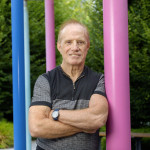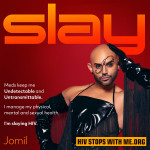I’m a nurse who works in what was one of the first comprehensive AIDS treatment centers in upstate New York. My mother was a patient here after she was diagnosed with HIV in 1987. Working here feels a little like coming full circle. I remember all too well the unbearable stigma that people with HIV faced. Our housekeeper quit, some friends and even some family shunned us and at one point the PTA wanted us out of our school. I remember watching my mother try to shoulder all of that in addition to the weight of her disease.
The staff at the center were warm, welcoming and made her feel safe. Being able to be a part of that team now and provide the same love and support to my patients has been so rewarding—and healing—for me in many ways. I work with a dynamic group of people who come to work each day and make a difference for our patients, and I feel lucky to be a part of that team. We have come a long way in HIV since it came into my life, but we still have a long way to go.
What three adjectives best describe you?
Compassionate, determined and funny (at least I think I’m funny).
What is your greatest achievement?
Overcoming the things I have overcome to become the person I am. It’s been a long and tempestuous road at times, and I was not always the best version of myself. But I feel like I’m pretty close these days.
What is your greatest regret?
Not getting to know my mother as an adult. And that my children and nephews and nieces will never meet her. She would have been exceptionally amazing at the grandma gig.
What keeps you up at night?
So many things, but lately, it’s the rampant hatred and division in our country. Compassion and respect for the suffering of fellow human beings is at an all-time low. It’s so sad to see it unfolding.
If you could change one thing about living with HIV, what would it be?
The stigma and the shame that is placed on people living with HIV, both self-induced and from society. We have come so far with treatments, disease management and preventative care, but the stigma remains.
What is the best advice you ever received?
Don’t judge a life you’ve never had to lead. Basically, you don’t always know what people are going through or what brought them to where they are at—so be kind.
What person in the HIV/AIDS community do you most admire?
Many people spring to mind, Ruth Coker Burks, Billy Porter, Pedro Zamora. But to be very honest, I admire my patients for their tenacity and my coworkers for their dedication more than anything.
What drives you to do what you do?
It sounds cheesy, but the personal interaction with my patients. It is so rewarding to have someone tell you that you’ve impacted their life in a positive way or made them feel less alone.
What is your motto?
“Your traumas can be triumphs or tragedies; it’s up to you to decide what you do with them.”
If you had to evacuate your house immediately, what is the one thing you would grab on the way out?
The video my mother made for me and my siblings before she passed. It was sent to us by a caseworker at NIH [National Institutes of Health] after her death, and, aside from my children, it is my most precious possession.
If you could be any animal, what would you be? And why?
A teacup-sized dog. It doesn’t matter which kind. Dogs that size just have the best accessories.







1 Comment
1 Comment